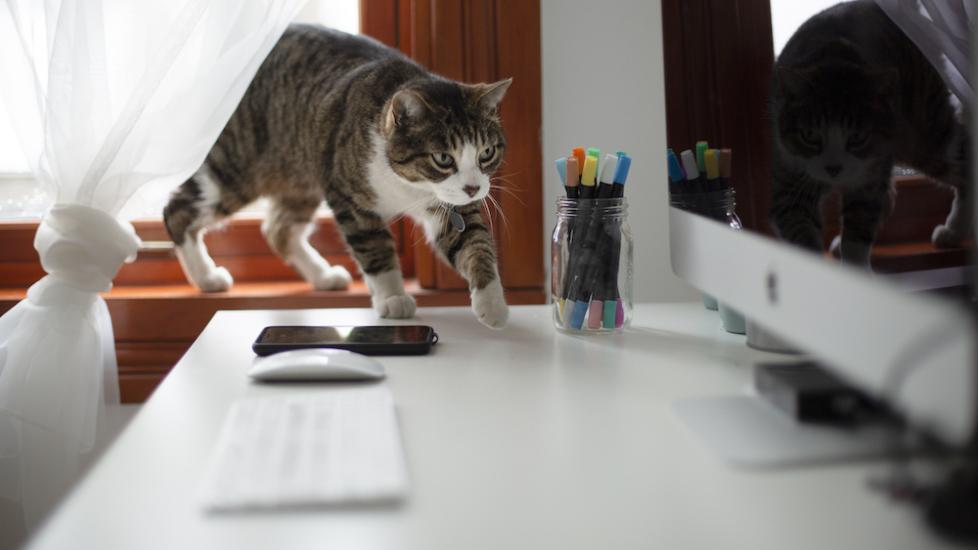Electrocution in Cats
What Is Electrocution in Cats?
Electrocution in cats is almost always accidental and fortunately not that common. But when it occurs, the effects can be quite devastating, even fatal. Electrocution is considered a medical emergency and often occurs when cats chew on an electrical cord or wire. The electrical energy from the cord passes through the body, which leads to tremors, arrhythmias (irregular heartbeat), breathing difficulties, shock, and changes in the nervous system.
After an injury to the nervous system, pulmonary edema (fluid in the lungs) can often happen due to changes in pressure and the release of certain chemicals and chemical agents in the cat’s body.
It is important to note that pulmonary edema can occur hours after the initial injury, which is why it is critical to seek veterinary treatment immediately, even if your cat seems fine. The severity of injuries can vary based on the type of electrical current, its strength, time of exposure, and resistance to it.
Types of Electrical Injuries in Cats
The most common cause of electrocution in cats occurs from biting or chewing wires. Cats can also experience electrical injuries from contact with exposed wires, faulty circuits, or being struck by lightning.
Even though all cats can suffer from electrical injuries, kittens and younger cats, often due to their inquisitive nature and teething behavior, will more commonly experience electrocution from chewing wires.
Symptoms of Electrocution in Cats
If you witness the electrocution, you will probably see your cat collapse, convulse, or develop muscle tremors. Her whiskers or facial hair may be singed, and there will most likely be burns on her lips, tongue, palate, and teeth. If not witnessed, symptoms of electrocution can appear as the following:
-
Apnea (lack of breathing)
-
Bluish gums and mucous membranes (lips, nose)
-
Coughing
-
Decreased appetite or trouble swallowing
-
Fractures to the teeth
-
Increased heart rate
-
Lethargy
-
Oronasal fistulae (holes that develop between the mouth and nasal cavity)
-
Respiratory distress—faster respiratory rate than normal; breathing with the whole body; or open-mouth breathing (panting)
-
Seizures or tremors
-
Sudden collapse and death
What To Do if Your Cat Chews an Electrical Cord
Thankfully, electrical cord injuries are uncommon, but when they occur, the effects are often serious. The first thing to do if you notice the electrocution or find your cat near an exposed wire is to turn off the electrical power or circuit breaker. Do not touch your cat until you are sure there is no active electrical current.
Second, evaluate your cat, looking for signs of consciousness, breathing, and a heartbeat. Your cat requires prompt medical evaluation even if she appears fine, because life-threatening complications can develop later.
Treatment of Electrocution in Cats
Treatment of electrical injuries in cats is often individual, based upon the severity of symptoms and degree of injuries, though supportive care measures are mainly used, including:
-
Oxygen therapy and pain management while minimizing stress are the most important and necessary steps for initial management. IV fluid therapy, careful use of diuretics, anti-arrhythmic drugs, muscle relaxers, and bronchodilators may be given, and some cats may require mechanical ventilation if respiratory problems are severe.
-
Burns are often treated with basic wound care—cleaning and bandaging, then antibiotics and pain management. Oral antiseptic mouth rinses along with sucralfate, a medication often prescribed to treat stomach ulcers, may be used to aid in coating lesions in the mouth and esophagus associated from secondary thermal burns.
-
Soft food or a gruel-type mixture may often be fed while the burns heal, and if the wounds are severe enough, a feeding tube may be warranted.
Recovery of Electrocution in Cats
Cats that receive prompt medical attention often have a good prognosis for recovery. Your cat will most likely need to be hospitalized and monitored for several days, as pulmonary edema often resolves in that timeframe, assuming no underlying permanent damage has occurred.
Fortunately, most cats recover without any significant long-term damage. Some cats with extensive burns may require additional procedures aimed at wound healing, which may include surgery.
Prevention of Electrocution in Cats
The most effective way to prevent electrical injuries to your cat is to prevent access to wires. “Cat proofing” your home is always a best practice prior to adoption. Keep doors closed or use baby gates if cats have access to rooms with exposed wires. You should also consider products such as anti-chew wire covers to keep cats protected from exposed wires.
Inspect cords for signs of wear and damage, then promptly get rid of exposed wires and unplug devices and cords when not in use. Additional steps to prevent injuries include anchoring cords to the wall with connectors or using a specially designed wire cover.
Especially during holiday months when more lights, cords, and fans may be used, it is critical to keep cats away from all plugs and cords.
Electrocution in Cats FAQs
Can cats get electrocuted?
Yes. Electrical injuries from lightning strikes or chewing on cords and wires can cause significant injury, including death.
Can cats die from chewing on cords?
Yes. Chewing on cords is by far the most common cause of electrocution in cats. Ingestion of the wires or their plastic coating can also cause an intestinal obstruction.
How long does it take for a cat to recover from electric shock?
Most cats that receive prompt medical attention and show mild to moderate symptoms of electric shock can recover within a few days. The first 24–48 hours are the most critical, and cats that suffer extensive injury, have more prolonged contact with wires or cords, or receive higher currents often have poor outcomes.
Featured Image: iStock.com/Linda Raymond
